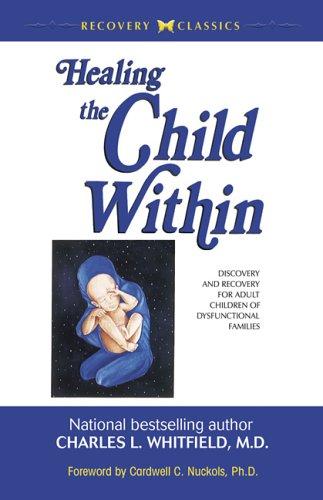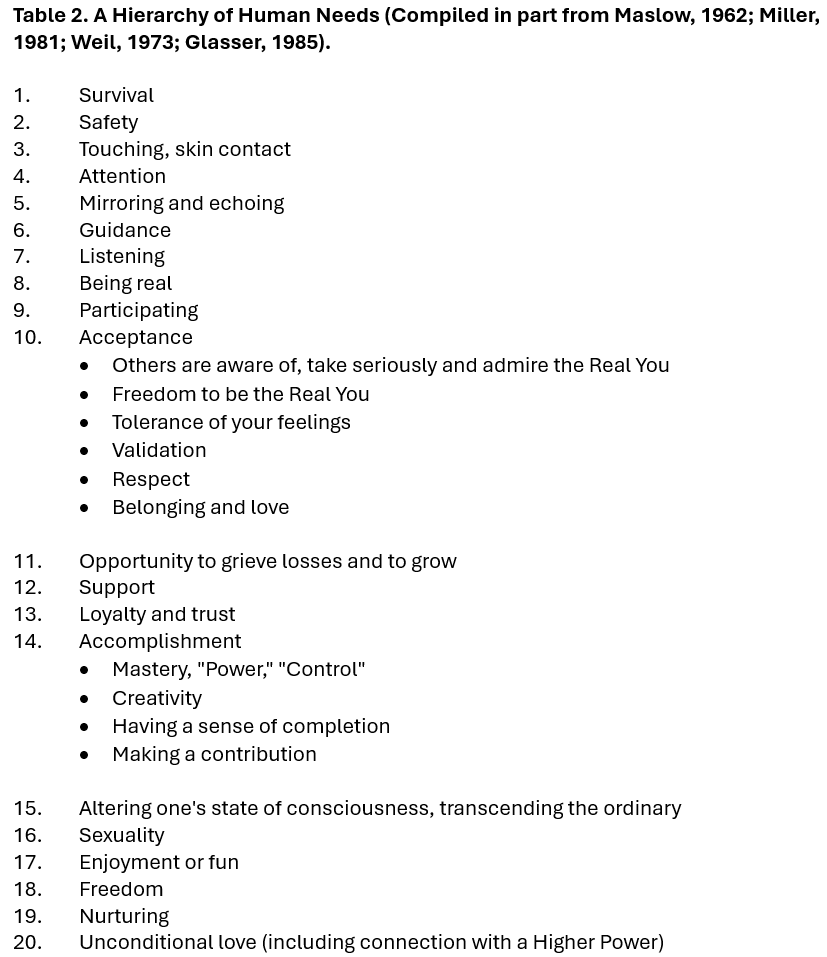Healing the Child Within:
Discovery and Recovery for Adult Children of Dysfunctional Families

Chapter 4
Stifling the Child Within
How do our parents, other authority figures and institutions such as education, organized religion, politics, the media, and even the helping professions stifle or deny our Child Within? How can we identify whether we were affected? What factors or conditions made our parents and others stifle our Child?
Some Human Needs
In ideal circumstances, some human needs must be fulfilled so that our Child Within can develop and grow. Drawing on authors such as Maslow (1962), Weil (1973), Miller (1983, 1984), and Glasser (1985), I compiled a hierarchical list of twenty factors or conditions that I call "human needs" (See Table 2). Nearly all are associated with our relationship with ourself and with people around us.

To reach our full potential, we apparently require most of these needs. Growing up in an environment without these needs, we grow up automatically without realizing that our needs have not been met and are not being met. We often feel confused and chronically unhappy.
Survival, Safety and Security
A newborn requires so much attention that someone must be available and able to provide enough needs for its simple survival. At the barest minimum, this includes its safety and security.
Touching
From studies by Spitz, Montague and others we know the importance of touching is a human need. Infants deprived of touching fail to thrive and grow, even if they get proper food, nourishment and protection. Touching is most powerful by appropriate skin to skin contact. Experiments with rabbits fed atherosclerosis-inducing diets show that those rabbits which are held and petted by the laboratory workers tend not to get atherosclerosis (hardening of the arteries). Those rabbits which are not held and petted tend to get atherosclerosis (Dossey, 1985).
It seems that to feel connected and cared for, we need to be hugged and touched. Virginia Satir has suggested that we need from four to twelve hugs a day as part of our health maintenance.
Attention
The child or individual must be attended to, i.e., given attention. The mother or other parent figure(s) must attend the infant and child so that at least its safety, security and touching are met.
Mirroring and Echoing
The next need begins to validate the infant, child or even the adult, as a feeling and thinking being. Mirroring and echoing is when the mother reacts non-verbally by facial expression, posture, sounds and other movements so that it realizes that it is understood.
At this point we understand that if the mother or other parent figure cannot provide these first few needs, the child's physical, mental-emotional and spiritual growth would likely be stunted. One reason may be that the mother herself is so impoverished and needy that she uses her infant to satisfy her own unmet needs. This is an amazing thing about infants. They can sense that mother is needy, and can eventually detect her specific needs and begin providing them for her. Of course, this carries a major price the denial, stifling and stunting of the infant's own True Self or Child Within. That price escalates as the child grows into an adult, with resulting physical, mental-emotional and spiritual suffering.
Guidance
Guidance, also a part of helping the infant and child to develop and grow, may include advice, assistance, and any other form of help, verbal or non-verbal. It also includes modeling and teaching appropriate and healthy social skills.
Listening, Participating and Accepting
It is helpful to know that someone hears us, even if they do not always understand. Increasingly nourishing forms or types of listening are associated with numbers 9 through 20 on this Needs Hierarchy, including participation with the child in appropriate activities, and accepting the Self the Child Within of the infant, child and eventual adult. The mother, other parent figure or concerned other is aware of, takes seriously and admires the other person's Real Self. They demonstrate their acceptance by respecting, validating, and being tolerant of the feelings of the other's Real Self. This allows the Child Within the freedom to be its authentic Self and to grow.
Now, readers may see that some of their needs were not perhaps are not being met. Yet we are but half-way through this hierarchy of our human needs.
Opportunity To Grieve Losses and To Grow
With each loss that we experience, whether it be a real or a threatened loss, we have a need to grieve it, i.e., to work through the associated pain and suffering. To do so takes time. And when we grieve our losses to completion, we grow. This process of grieving and growing is what a major part of this book is about.
Support
Support implies that the friend or caretaker will not block the Real Self's seeking, receiving input and creating, and will do everything possible to assure that the Real Self can fulfill its potential. Support includes actively doing whatever is possible to see that the Real Self is able to fulfill its potential.
Loyalty and Trust
Being supportive requires loyalty and trust from both the giver and the receiver. A person cannot betray another person's True Self for long without causing serious damage to the relationship. In order to grow, the Child Within should feel trusted and be able to trust others.
Accomplishment
On a basic level, achieving or accomplishing implies empowerment, ''power," "control," or the potential to master, i.e., belief that the person can accomplish a task. On a higher level, this means not only completing the task, but also being aware that the task is complete. Perhaps the highest level of accomplishment is the feeling that one made a contribution, which offers meaning to the task.
Some people who grew up in troubled or dysfunctional families found it difficult to complete a task or a project or to make decisions. This is because they did not practice doing so with the guidance and support of an important other. By contrast, others from dysfunctional families may be high achievers in some areas, such as education or work, but are repeatedly unable to achieve in other areas, such as intimate relationships.
Altered Consciousness, Enjoyment and Fun
Classifying the alteration of one's state of consciousness as a human need is somewhat controversial. This is because of the folklore that altered consciousness implies using alcohol or other mood-changing drugs (Weil, 1973). Actually, we seem to have an innate even a biological need to periodically alter our conscious state, whether it be by daydreaming, laughing, playing sports, concentrating on a project or sleeping. Closely related to this is another need and also an altered state: enjoyment or having fun. Many children from troubled families have difficulty relaxing and having fun. Ability to be spontaneous and to play is a need and a characteristic of our Child Within.
Sexuality
Sexuality is often not mentioned as a human need. Rather than sexual intercourse alone, by sexuality I mean a range of potentials, from feeling good about being a man or a woman, to enjoying various aspects of being sexual, to discovering the man (animus) inside the psyche of the woman or the woman (anima) inside the man.
Many of us who grew up in troubled homes may have difficulty with our sexual identity, functioning or enjoyment. Some of us may have been sexually abused, whether overtly or covertly.
Freedom
Having the freedom to risk, explore and do what is spontaneous and necessary is another human need. Along with this freedom comes responsibility. For example, spontaneity tends to be healthy, whereas impulsivity may work against our best interests.
Nurturing
